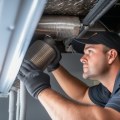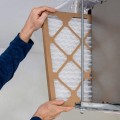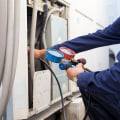Any air filter rated higher than 13 can restrict airflow to the point of causing damage to your HVAC system, resulting in costly repairs. In general, filters with higher MERV ratings capture higher percentages of particulates as well as smaller particles. MERV-13 is practically the ideal rating for most homes. Reduced airflow can also affect the cooling side of your HVAC system.
The air conditioner has a hot coil on the outside, the condenser, and a cold coil on the indoor air handler. This cold coil has a specific preferred operating temperature, based on a certain amount of hot air flowing through it and the coolant circulating through its copper tube. With a higher MERV filter, this crucial part of the air conditioning system can eventually freeze and become an ice ball, completely blocking airflow. Without going into further detail, this can cause more expensive problems in the outdoor condenser coil.
A MERV rating of 13 to 16 is considered hospital-level air quality, so your home is unlikely to need more than that. According to the United States Environmental Protection Agency, filters in the 7-13 range often have little difference from higher MERV ratings, but they will allow your system to work much more efficiently. Not all filters have a Merv rating &, many of them are purchased at big box stores. The American Society of Heating, Refrigeration and Air Conditioning Engineers (ASHRAE) recommends MERV 13 and 14, but it's best to select a filter with the highest possible MERV rating for your specific HVAC system.
When you have a filter from Merv 13 and above, it is more similar to the material you would find in an n95 dust mask. While air filters with a one-to-four MERV are effective at removing large particles such as carpet fibers, airborne paint droplets and sanding dust, they cannot help with contaminants such as hairspray, mold spores or even flour that might have escaped from the mixer. High-MERV filtering is especially important for people with allergies or asthma. MERV filters 9 to 12 are the best filters that a residential HVAC system can accommodate without major system modifications.
It seems that it would be enough to just use the high merv filter media, blast it with compressed air, and then insert the filter into a pocket of the DIY face mask, between the two layers of fabric. Technology for HVAC units has progressed since then and most modern units in recent years should be capable of at least one MERV 8 filter. However, high MERV filters offer superior filtration, trapping everything from construction dust and tobacco smoke to bacteria. According to Avery, in a new construction it is easy to accommodate a high MERV filter without static pressure penalty (see my previous comment). Increasing a filter to increase a filter to a higher MERV can increase the delta P through the filter.
Although ASHRAE suggests MERV 13, it may not be the most efficient option for some residential HVAC systems. If your furnace's MERV rating is too high, it can force it to work too hard and leave it vulnerable to damage.






